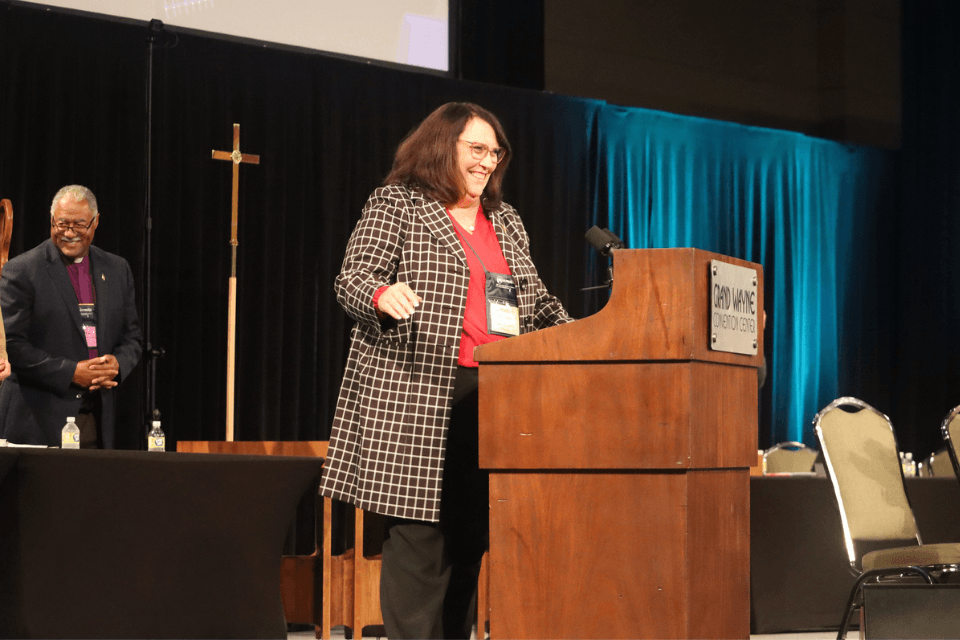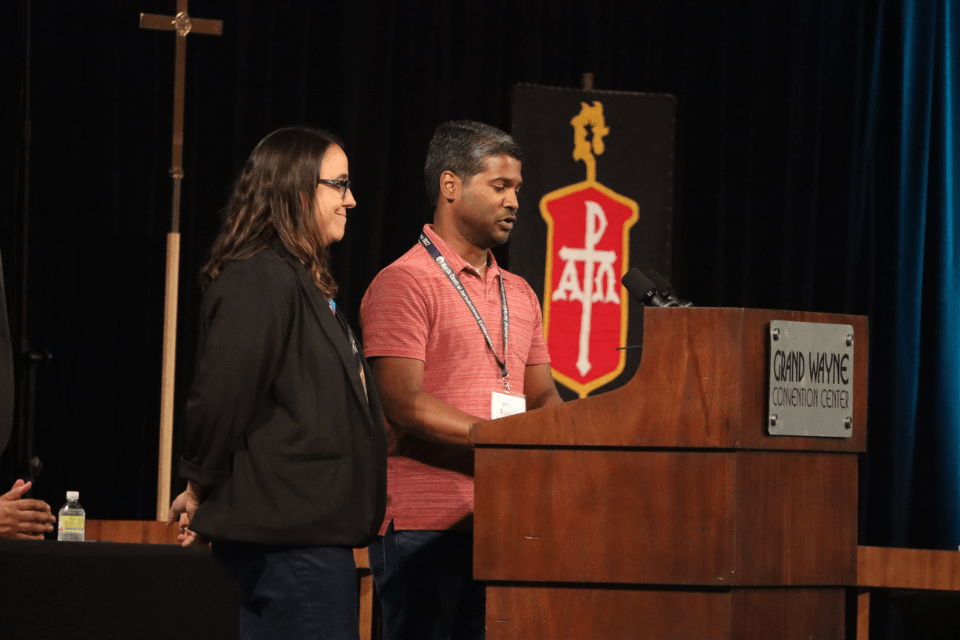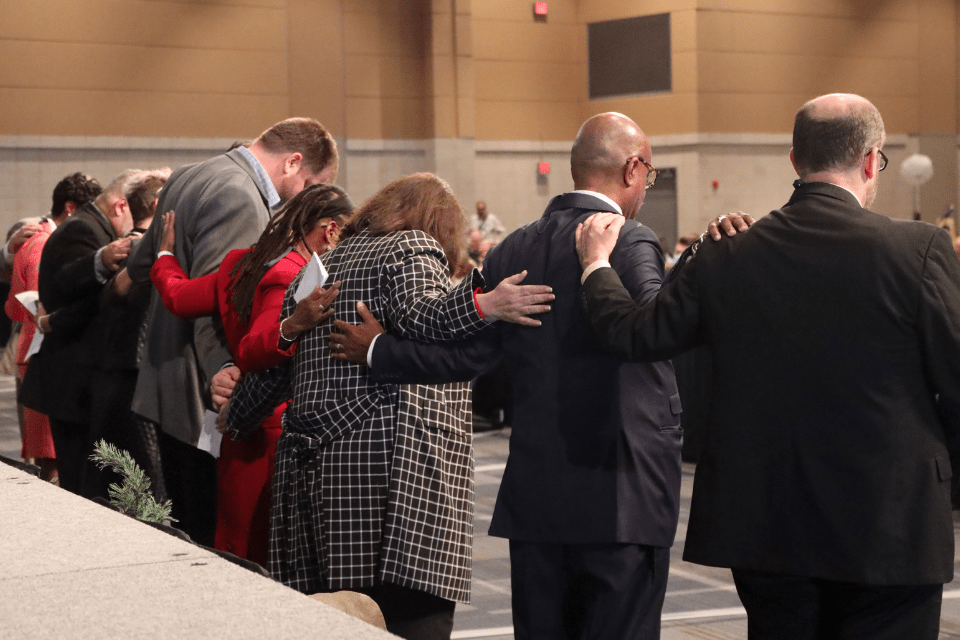The North Central Jurisdictional Conference kicked off on Wednesday with the election of two bishops and updates on the work of the jurisdiction, including the Mission Council.
REV. CINDY GREGORSON
Director of Connectional Ministries and Clergy Assistant to the Bishop, Minnesota Conference
“This is the sound of dry bones rattling. Open the grave, I’m coming out. I’m gonna live, gonna live again!”
The delegates of the 2022 North Central Jurisdictional Conference were on their feet, proclaiming in song that these dry bones will live as they opened their session in worship. Bishop Bruce R. Ough continued this theme in his opening sermon, naming the question we all might be asking: how do we press on when we are overwhelmed by disaffiliation, souls are parched, and we are so very, very tired? He went on to proclaim, “I think God has us right where God wants us. God has given us a word. It is never too late for dry bones to live!”
Bishop Elections
The sounds of the bones rattling showed up in multiple ways on this first day of the conference. The Michigan Conference’s only episcopal candidate, the Rev. Kennetha Bigham-Tsai was elected bishop on the first ballot, a historic first for the North Central Jurisdictional Conference. Rev. Bigham-Tsai picked up echoes of Bishop Ough’s words in her addressing the conference upon her election.
“We have seen what is possible for the United Methodist Church. It is time to reclaim the narrative of the possible,” Bigham-Tsai said. “Thank you for seeing what is possible in me, but even more for what is possible in our church.”
Her unprecedented election came after all 10 of the episcopal candidates addressed the body in a shared statement of prayer and unity.
“As your episcopal candidates, we are united in our commitment to the now and future United Methodist Church,” they said in their shared statement. “As your episcopal candidates, we will have the courage and courtesy to hold fast to the integrity of this process. Even in the moments when it convicts us, even when the outcome is not what we’d hoped . . . we are already committed to celebrating with and for those elected rejoicing for the church in the company of our next three bishops.”

Before the evening was done, a second bishop was elected: Rev. Dr. Lanette Plambeck from Iowa. Read more about her election here.
“All I want to do, truly do, to the deepest part of who I am, is to glorify God in my service. I want to love the people, all the people, all the time,” she said about her leadership as a bishop. “I love you. And I love our God. And I love the United Methodist Church. I wasn’t born in it, but I was called into it. And I believe to the very depth of who I am and that our very best years are ahead of us, and they are right here, right now.”
NCJ Episcopacy Going Forward
The North Central Jurisdictional delegates approved a recommendation from the Committee on Episcopacy to elect three bishops at this session. The retirement of Bishop Laurie Haller was approved effective Dec. 31, 2022, which, along with the previous retirements of Bishops Bruce Ough and Sally Dyck in 2020, created three vacancies. Rev. Sara Isbell, chair of the Committee on Episcopacy, noted that this was counter to the previous recommendation for two elections. She recognized the unique demands of this time on bishops, and she reminded attendees of the fact that we will have two retirees in 2024 who will reach the age of mandatory retirement.
The expectation is that the North Central Jurisdiction will need to imagine more shared episcopal areas in our future. All conferences were asked to engage in exploratory conversation about sharing episcopal leadership. The conferences of Wisconsin and Northern Illinois and the conferences of East and West Ohio were specifically called to investigate becoming episcopal areas. A task force was also formed to look at the function and role of bishops in our jurisdiction, given what will be increasing demands for episcopal oversight.
Work of the Mission Council
Rev. Ryan Russell and Laura Witkowski, current chair and vice-chair of the Mission Council of the North Central Jurisdiction, shared that the focus of the Mission Council was spiritual leadership, outreach, and serving as the finance committee, rules committee, and grants committee on behalf of the jurisdiction. The Mission Council, in consultation with the College of Bishops, saw the need to gather the delegates of the jurisdiction ahead of the 2019 General Conference to create space for spiritual growth and fellowship. Two of those gatherings were held in 2018 and 2019. The Council also shifted in the way they make grants, moving to an annual grant application process for jurisdictional programming. Curtis Brown reported on the actions taken in response to the Covenant to Build Beloved Community passed at the 2021 Jurisdictional Conference. The leaders in the conferences working in the area of equity, inclusion, and racial justice gathered in October and created a plan to conduct a jurisdiction-wide racial audit in 2023. They will bring a report back to the Jurisdictional Conference in 2024. $10,000 has been set aside to fund an outside contractor to assist with the data gathering.

Lonnie Chafin presented the proposed 2022 Jurisdictional Budget, which would hold the apportionment level for each annual conference. In doing so, he noted that the North Central Jurisdiction has the smallest apportionments among the jurisdictions in the United States. This budget covers two years. A four-year proposal will come in 2024. He thanked the annual conferences for 100 percent of their apportionment payment. Chafin offered an extra word of thanks for the Dakotas-Minnesota Area for the stewardship of the funds granted to them as the host committee of the postponed 2020 General Conference, keeping the expected planned use of reserves of the 2016 approved budget to $82,000 instead of $251,000. The 2022 budget will be voted on Friday.
Last Updated on November 3, 2022

